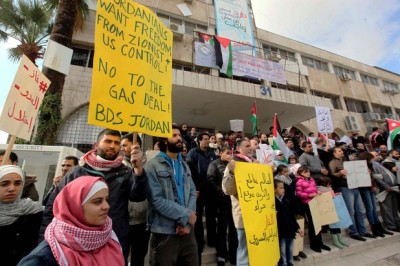Gas Deal with Israel Is “Knife at Jordan’s Throat,” Say Campaigners

Jordanians protest against a gas deal with Israel in Amman, 28 November 2014. (EPA)
Jordanian campaigners are demanding that an agreement on importing gas from Israel be scrapped.
At least 26 organizations, including trade unions and political parties, have joined the Jordanian Campaign to Stop the Zionist Gas Deal.
The state-owned National Jordanian Electric Power Company (NEPCO) has signed a $15 billion agreement to buy 300 million cubic feet of natural gas from Israeli-controlled parts of the Mediterranean Sea over a 15 year period.
The gas will be extracted from the Leviathan gas field situated in the eastern Mediterranean. The extraction project is being led by the US giant Noble Energy.
The Israeli government stands to make $8.4 billion from the deal because of clauses relating to taxes and royalties, according to a report published by the campaigners.
“Israel has tried very hard to push normalization with the Jordanian people over the past twenty years in various areas including the economic and cultural spheres, but it has failed,” Hisham Bustani, a spokesperson for the campaign, said.
Energy minister Mohammed Hamed has tried to justify the gas deal by claiming it would allow Jordan to diversify its sources of gas. Jordan has for many years been reliant on gas imports from Egypt.
But the supply of Egyptian gas has been interrupted in recent years because of problems in the Egyptian energy market.
Yet many of Jordan’s members of parliament do not share Hamed’s view. Only 15 of 225 parliamentarians supported the gas deal in December.
“Dubious deals”
Though the majority voted against the gas deal, the decision was non-binding because the Jordanian government has not put the gas deal up for parliamentary approval.
Ali Abu Sukkar, deputy secretary-general of the Islamic Action Front, the largest opposition party in Jordan, said the gas deal “contradicts the will and the conscience of the Jordanian people.”
“The Jordanian people reject all the dubious deals with our enemy that aim to normalize relations. The regime must reconcile itself with its people,” Abu Sukkar told The Electronic Intifada.
Though Jordanian supporters of the gas deal have attempted to present it as an agreement with the Texas-based Noble Energy, the consortium behind the project includes the Israeli firms Delek Drilling, Avner Oil Exploration (a subsidiary of Delek) and Ratio Oil Exploration.
In 1994, Jordan signed the Wadi Araba Agreement, a peace treaty with Israel — normalizing relations at the expense of Palestinian rights, according to critics.
“There should not be any relationship with this enemy,” Abd al-Majeed Dandees, a member of the leftist Jordanian Democratic Popular Unity Party, told The Electronic Intifada. “In general, Jordanian political parties, trade unions, professional associations and activist groups reject the Wadi Araba treaty as a whole and not just this gas deal.”
Jordan yet again expanded its economic cooperation with Israel in February when it signed an $800 million agreement on exploiting the Dead Sea’s resources. The Jerusalem Post reported that the deal will give Israel access to water treated at a desalination plant in the in the Jordanian city of Aqaba.
Protests
Jordan forged ahead with the gas deal last year even as it professed to protest Israel’s violations of Palestinian rights.
Last November, as Israel cracked down on Palestinians in occupied East Jerusalem and limited their access the al-Aqsa mosque, Jordan recalled its ambassador to Israel. However, Walid Obeidat, the ambassador, was sent back to Tel Aviv last month.
Meanwhile, thousands marched in cities across Jordan last November as Israel escalated its attacks on Palestinians in the occupied West Bank. The protesters demanded that Jordan scrap the Wadi Araba agreement and close the Israeli embassy in Amman.
Earlier in the year, in March, protests were held outside the Israeli embassy in the Jordanian capital after the fatal shooting of Raed Zuaiter. A Palestinian-Jordanian judge and father of two young children, Zuaiter was attempting to cross from Jordan into the West Bank at the King Hussein (Allenby) crossing when he was shot by an Israeli soldier.
Muhammed Abu Ghanaimah is president of the Jordanian Professional Associations Council and the Jordanian Agricultural Engineers Association, both of which are against the gas deal.
“This campaign is important because it represents the feeling and conviction that we all have that this deal will be a knife at the throat of Jordan and the Jordanian people,” Abu Ghanaimah told The Electronic Intifada.
“The consequences of this deal will be very dangerous, in economic as well as political terms and in its effect on Jordanian sovereignty,” he added.
Further protests against the gas deal are planned for Friday.
Thoraya El-Rayyes contributed translation.
Patrick O. Strickland is an independent journalist and regular contributor to The Electronic Intifada. His website is www.postrickland.com. Follow him on Twitter:@P_Strickland_.

